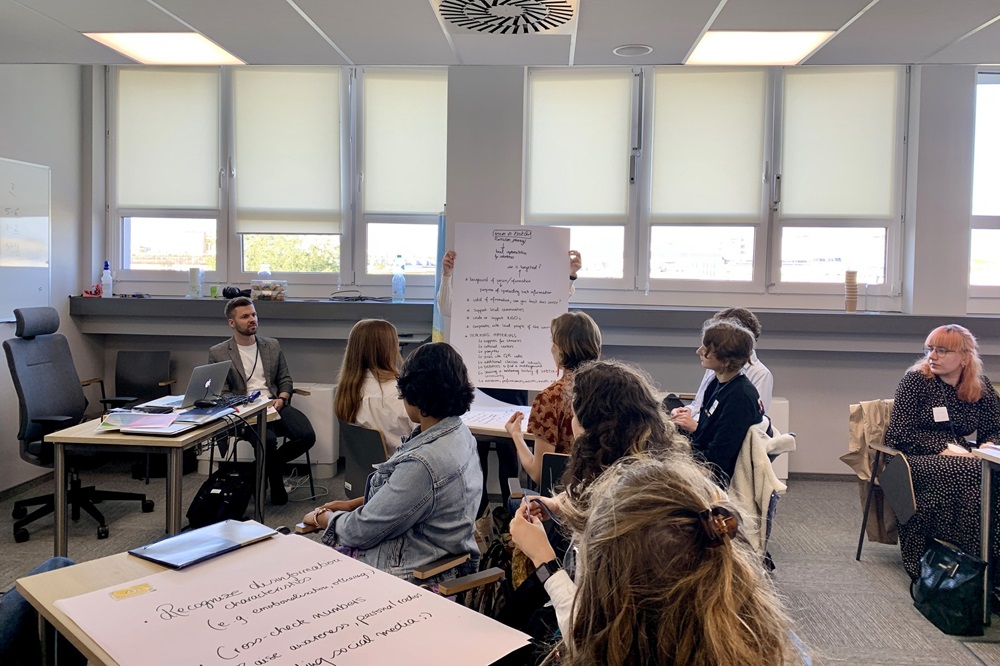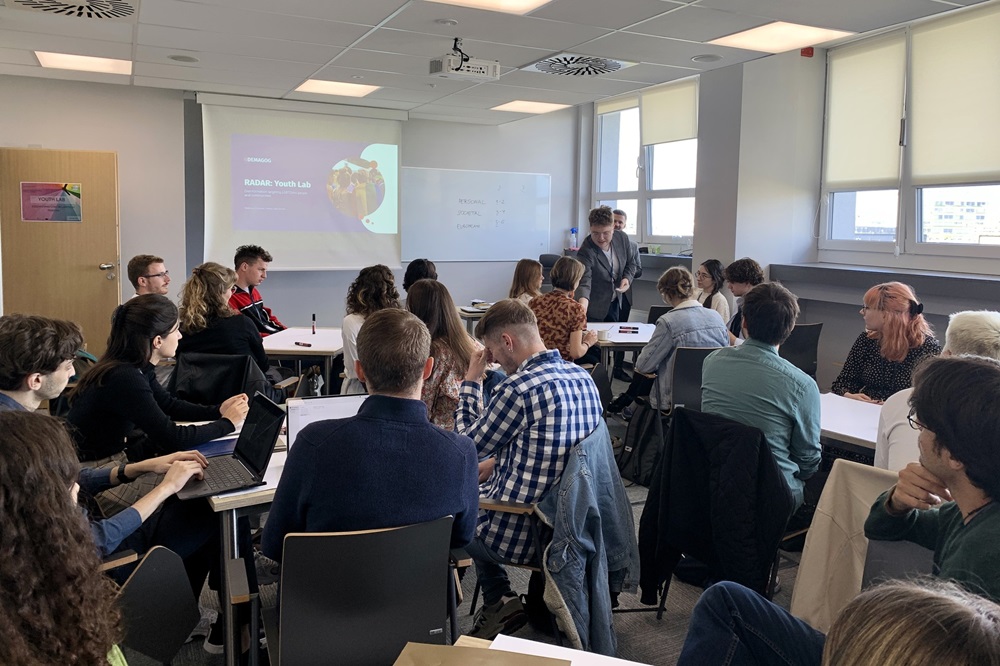- Short summary of the event, key messages/ testimonies collected at the event
The event, lasting around 2.5 hours, was held on 6 October 2023, from 1 pm to 3.30 pm, at the Faculty of International and Political Studies of the Jagiellonian University in Kraków, Poland.
It was facilitated by two experienced media and information literacy trainers: Patryk Zakrzewski (board member of the Demagog Association, fact-checking trainer, and mentor) and Mateusz Cholewa (Demagog.org.pl analyst, journalist, and fact-checking trainer). The workshop consisted of two parts.
Each part began with a brief introduction which showcased the most frequent types of mis- and disinformation about LGBTQIA+ people. In the first part of the training, participants learned about the main misleading narratives, such as ‘LGBTQIA+ as a threat to child safety’, as well as examples of deepfakes and false political claims. In the second part, they enlarged their knowledge about misleading content in social media, manipulation techniques, and data manipulation. The presentation used examples from various countries, including Poland to present the specificity of its context.
The introduction was a starting point for the conversation in subgroups. In each part students talked through possible solutions for previously discussed types of mis- and disinformation. They developed their ideas on three levels: personal, social, and European. The discussion was then moved to the forum, where participants shared their thoughts with other groups. As a result, a list of the five most important recommendations was created:
Providing access to reliable information about LGBTQIA+ community-related issues
Information voids, which can be defined as insufficient supply of reliable information on a given topic in the context of high demand on such information, create perfect condition for spread of misleading content and manipulative narratives. For that reason, we recommend strengthening efforts to provide access to reliable information about LGBTQIA+ community-related issues to all European Union citizens. To achieve this goal, we propose establishing an open-access hub/archive for self-learning with resources translated to all European languages as well as creating a certification system for assessing the reliability of sources covering LGBTQIA+ community-related issues. Additionally, more financial resources should be allocated to the research on LGBTQIA+.
European Social Media Campaign
Countering LGBTQIA+ community-related mis- and disinformation, and hate speech requires timely reaction to misleading content distributed in social media, but also preemptive measures such as positive narrative campaigns. Therefore, we propose establishing a granting program that will enable civil society organizations to apply for funding necessary to run such campaigns. CSOs’ efforts in this regard should be supported with close cooperation with reliable social media influencers and recognized fact-checking organizations.
Further regulations on disinformation, artificial intelligence, hate speech and discrimination
Wise regulations are one of the core elements of healthy and safe infosphere. The Internet, as much as other services, and industries, e.g., aviation or construction, should be appropriately regulated – to support people in exercising the right to access information as well as the freedom of speech with respect to human rights. For these reasons, we encourage European institution to demand more from the big tech companies in regard to preventing spread of misinformation, e.g., through content labeling based on independent assessment provided by recognized fact-checking organizations. To assure public consensus over the regulations, further communication efforts should be introduced. Otherwise, the legislation might be wrongly perceived as limitation to freedom of speech or even as censorship.
Supporting education and research on media literacy and countering disinformation
We recognize education as an essential tool in preventing dissemination of falsehood and misleading narratives about the LGBTQIA+ community. We therefore propose a set of actions aimed at strengthening existing initiatives in the field of media and information literacy (MIL), as well as promoting formation of the new ones. This includes formal MIL education at all levels from pre-school education up to the university level, educational programs for parents, and training for journalists on how to cover LGBTQIA+ stories. To ensure the highest quality and effectiveness of such educational interventions, related research projects should be supported as well. Moreover, scientific research might result in developing new tools that will facilitate navigating the infosphere, e.g., through deepfakes detection.
Strengthening communication in communities with limited access to the Internet
Although the Internet is a service available throughout Europe, some communities still do not use it due to limited infrastructure or digital exclusion. As a result, they may lack reliable information about the LGBTQIA+ community or be susceptible to misinformation spread by word of mouth. For this reason, we support greater exposure of issues related to the LGBTQIA+ community in traditional media, such as radio and television, including in programs debunking popular myths about LGBTQIA+ people and presenting stories about older LGBTQIA+ generations. These activities should also include workshops conducted by university communities for neighboring communes, including rural ones.
The event was based on a concerted creative activity of participants, who demonstrated their engagement in combatting disinformation on LGBTQIA+ persons.
- Information about participants
There were 30 participants of the youth lab. In total, they came from 8 different countries. Most participants were residents of Poland (although not necessarily of Polish citizenship), followed by Italy and Hungary, with singular representatives of other EU countries. Majority of participants identified as female (16), followed by male (10. 4 persons preferred not to declare themselves.


